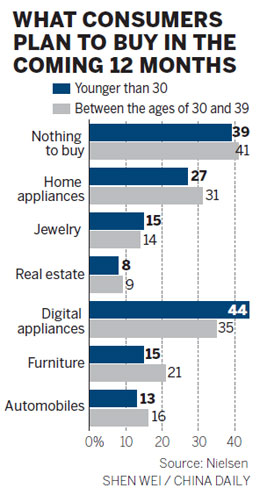Chinese rural consumer most confidence
Updated: 2012-08-02 09:42
By Wei Tian (China Daily)
|
||||||||
Consumer confidence in China's biggest cities rallied in the second quarter of the year, reaching its highest level in nearly three years, spurred by improving job prospects, better personal finances and a greater willingness to spend, according to a survey.
But it was rural consumers who remained the most optimistic, said Nielsen, the global information and measurement company which carried out the analysis.
The results for China were contained in a world survey that polled more than 28,000 consumers in 56 countries. The findings showed that China's consumer confidence was significantly ahead of global sentiment.
Consumer confidence levels above and below a baseline of 100 indicate degrees of optimism and pessimism.
The Chinese findings showed the consumer confidence index for first-tier cities was the only regional sub-index to rise quarterly - but the bounce to 107 from 101 in the first three months of the year still left China's biggest cities lagging behind their rural cousins, which remained the most optimistic with a confidence index of 113, 8 index points above the national average of 105.
Job optimism
Year-on-year, rural confidence increased 3 index points.
Chinese consumer confidence decreased 5 index points during the quarter, yet was still a clear 14 points above the global average of 91.
"After a few consecutive quarters of increases in consumer confidence, it is reasonable to see some pullback," said Yan Xuan, president of Nielsen Greater China.
"Confidence cannot increase indefinitely, especially in light of the current global economy and the ongoing European debt woes as well as their impact on China's export growth.
"But over time, the Chinese government's efforts to transform China into a consumption-led economy will pay off for the country."
Consumers in rural Chinese areas indicated the greatest confidence about their employment prospects (92 percent) followed by consumers in first-tier cites, where 52 percent of consumers were bullish about their job prospects in the next six months, 7 points up from the previous quarter.
In contrast, consumers in second-tier cities were the least optimistic and exhibited below average confidence about their employment prospects.
"Affected by the global economic downturn, the weak manufacturing and export sectors led to poor job prospects for consumers in lower-tier cities, especially in second-tier cities," Yan said.
"In first-tier cities, job growth in the service industry boosted consumer confidence in their job expectations."

 Relief reaches isolated village
Relief reaches isolated village
 Rainfall poses new threats to quake-hit region
Rainfall poses new threats to quake-hit region
 Funerals begin for Boston bombing victims
Funerals begin for Boston bombing victims
 Quake takeaway from China's Air Force
Quake takeaway from China's Air Force
 Obama celebrates young inventors at science fair
Obama celebrates young inventors at science fair
 Earth Day marked around the world
Earth Day marked around the world
 Volunteer team helping students find sense of normalcy
Volunteer team helping students find sense of normalcy
 Ethnic groups quick to join rescue efforts
Ethnic groups quick to join rescue efforts
Most Viewed
Editor's Picks

|

|

|

|

|

|
Today's Top News
Health new priority for quake zone
Xi meets US top military officer
Japan's boats driven out of Diaoyu
China mulls online shopping legislation
Bird flu death toll rises to 22
Putin appoints new ambassador to China
Japanese ships blocked from Diaoyu Islands
Inspired by Guan, more Chinese pick up golf
US Weekly

|

|







